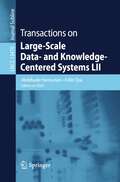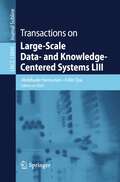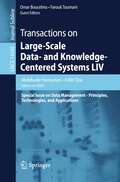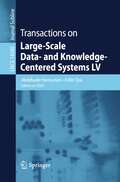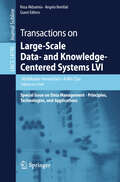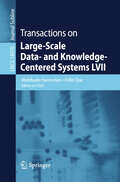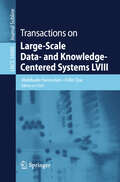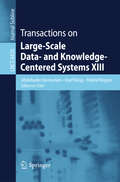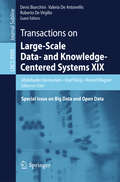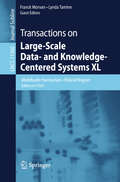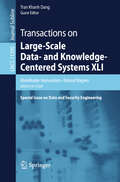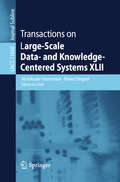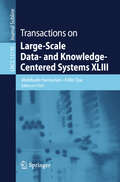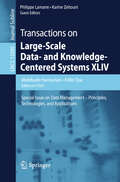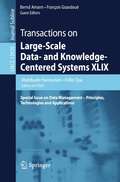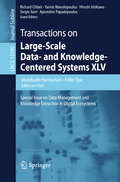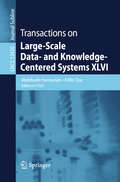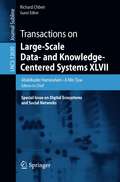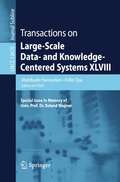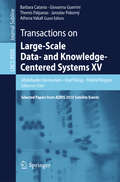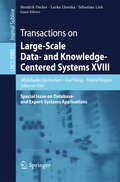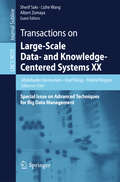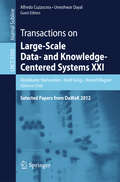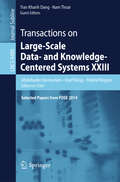- Table View
- List View
Transactions on Large-Scale Data- and Knowledge-Centered Systems LII (Lecture Notes in Computer Science #13470)
by Abdelkader Hameurlain A Min TjoaThe LNCS journal Transactions on Large-Scale Data and Knowledge-Centered Systems focuses on data management, knowledge discovery, and knowledge processing, which are core and hot topics in computer science. Since the 1990s, the Internet has become the main driving force behind application development in all domains. An increase in the demand for resource sharing (e.g., computing resources, services, metadata, data sources) across different sites connected through networks has led to an evolution of data- and knowledge-management systems from centralized systems to decentralized systems enabling large-scale distributed applications providing high scalability.This, the 52nd issue of Transactions on Large-Scale Data and Knowledge-Centered Systems, contains 6 fully revised selected regular papers.
Transactions on Large-Scale Data- and Knowledge-Centered Systems LIII (Lecture Notes in Computer Science #13840)
by Abdelkader Hameurlain A Min TjoaThe LNCS journal Transactions on Large-scale Data and Knowledge-centered Systems focuses on data management, knowledge discovery, and knowledge processing, which are core and hot topics in computer science. Since the 1990s, the Internet has become the main driving force behind application development in all domains. An increase in the demand for resource sharing (e.g. computing resources, services, metadata, data sources) across different sites connected through networks has led to an evolution of data- and knowledge-management systems from centralized systems to decentralized systems enabling large-scale distributed applications providing high scalability. This, the 53rd issue of Transactions on Large-scale Data and Knowledge-centered Systems, contains six fully revised selected regular papers. Topics covered include time series management from edge to cloud, segmentation for time series representation, similarity research, semantic similarity in a taxonomy, linked data semantic distance, linguistics-informed natural language processing, graph neural network, protected features, imbalanced data, causal consistency in distributed databases, actor model, and elastic horizontal scalability.
Transactions on Large-Scale Data- and Knowledge-Centered Systems LIV: Special Issue on Data Management - Principles, Technologies, and Applications (Lecture Notes in Computer Science #14160)
by Abdelkader Hameurlain A Min Tjoa Farouk Toumani Omar BoucelmaThe LNCS journal Transactions on Large-scale Data and Knowledge-centered Systems focuses on data management, knowledge discovery, and knowledge processing, which are core and hot topics in computer science. Since the 1990s, the Internet has become the main driving force behind application development in all domains. An increase in the demand for resource sharing across different sites connected through networks has led to an evolution of data- and knowledge-management systems from centralized systems to decentralized systems enabling large-scale distributed applications providing high scalability. This, the 54th issue of Transactions on Large-Scale Data and Knowledge-Centered Systems, contains three fully revised and extended papers and two additional extended keynotes selected from the 38th conference on Data Management - Principles, Technologies and Applications, BDA 2022. The topics cover a wide range of timely data management research topics on temporal graph management, tensor-based data mining, time-series prediction, healthcare analytics over knowledge graphs, and explanation of database query answers.
Transactions on Large-Scale Data- and Knowledge-Centered Systems LV (Lecture Notes in Computer Science #14280)
by Abdelkader Hameurlain A Min TjoaThe LNCS journal Transactions on Large-scale Data and Knowledge-centered Systems focuses on data management, knowledge discovery, and knowledge processing, which are core and hot topics in computer science. Since the 1990s, the Internet has become the main driving force behind application development in all domains. An increase in the demand for resource sharing across different sites connected through networks has led to an evolution of data- and knowledge-management systems from centralized systems to decentralized systems enabling large-scale distributed applications providing high scalability.This, the 55th issue of Transactions on Large-Scale Data and Knowledge-Centered Systems, contains five fully revised regular papers covering a wide range of very hot topics in the fields of data driven science life science, workflows, weak signals, online social networks, root cause analysis, detected anomalies, analysis of interplanetary file systems, concept weighting in knowledge graphs, and neural networks.
Transactions on Large-Scale Data- and Knowledge-Centered Systems LVI: Special Issue on Data Management - Principles, Technologies, and Applications (Lecture Notes in Computer Science #14790)
by Abdelkader Hameurlain Angela Bonifati A Min Tjoa Reza AkbariniaThe LNCS journal Transactions on Large-scale Data and Knowledge-centered Systemsfocuses on data management, knowledge discovery, and knowledge processing, which are core and hot topics in computer science. Since the 1990s, the Internet has become the maindriving force behind application development in all domains. An increase in the demand forresource sharing across different sites connected through networks has led to an evolution ofdata- and knowledge-management systems from centralized systems to decentralized systemsenabling large-scale distributed applications providing high scalability. This, the 56th issue of Transactions on Large-Scale Data- and Knowledge-Centered Systems,contains five fully revised and extended papers selected from the 39th conference on DataManagement - Principles, Technologies and Applications, BDA 2023. The topics cover awide range of timely data management research topics on adaptive learning, personal datamanagement systems, topic discovery in large corpora, spatio-temporal query processing, anddata generation.
Transactions on Large-Scale Data- and Knowledge-Centered Systems LVII (Lecture Notes in Computer Science #14970)
by Abdelkader Hameurlain A Min TjoaThe LNCS journal Transactions on Large-scale Data and Knowledge-centered Systemsfocuses on data management, knowledge discovery, and knowledge processing, which arecore and hot topics in computer science. Since the 1990s, the Internet has become the maindriving force behind application development in all domains. An increase in the demand forresource sharing (e.g. computing resources, services, metadata, data sources) across differentsites connected through networks has led to an evolution of data- and knowledge-managementsystems from centralized systems to decentralized systems enabling large-scale distributedapplications providing high scalability. This, the 57th issue of Transactions on Large-scale Data and Knowledge-centered Systems,contains five fully revised selected regular papers. Topics covered include leveraging machinelearning for effective data management, access control models, reciprocal authorizations,Internet of Things, digital forensics, code similarity search, volunteered geographicinformation, and spatial data quality.
Transactions on Large-Scale Data- and Knowledge-Centered Systems LVIII (Lecture Notes in Computer Science #16080)
by Abdelkader Hameurlain A Min TjoaThe LNCS journal Transactions on Large-scale Data and Knowledge-centered Systems focuses on data management, knowledge discovery, and knowledge processing, which are core and hot topics in computer science. Since the 1990s, the Internet has become the main driving force behind application development in all domains. An increase in the demand for resource sharing (e.g. computing resources, services, metadata, data sources) across different sites connected through networks has led to an evolution of data- and knowledge-management systems from centralized systems to decentralized systems enabling large-scale distributed applications providing high scalability. This, the 58th issue of the Transactions on Large-scale Data and Knowledge-centered Systems, contains five fully revised selected regular papers. Topics covered include storing and querying evolving graphs in NoSQL storage models, the data assetization journey, deep learning rainfall nowcasts, fairness assessment, and energy and flexibility based on FlexOffers and Blockchain.
Transactions on Large-Scale Data- and Knowledge-Centered Systems XIII
by Abdelkader Hameurlain Josef Küng Roland WagnerThis, the 13th issue of Transactions on Large-Scale Data and Knowledge-Centered Systems, contains six revised selected regular papers. Topics covered include federated data sources, information filtering, web data clouding, query reformulation, package skyline queries and SPARQL query processing over a LaV (Local-as-View) integration system.
Transactions on Large-Scale Data- and Knowledge-Centered Systems XIII (Lecture Notes in Computer Science #8420)
by Abdelkader Hameurlain, Josef Küng and Roland WagnerThis, the 13th issue of Transactions on Large-Scale Data and Knowledge-Centered Systems, contains six revised selected regular papers. Topics covered include federated data sources, information filtering, web data clouding, query reformulation, package skyline queries and SPARQL query processing over a LaV (Local-as-View) integration system.
Transactions on Large-Scale Data- and Knowledge-Centered Systems XIX
by Abdelkader Hameurlain Josef Küng Roland Wagner Devis Bianchini Valeria De Antonellis Roberto De VirgilioThe LNCS journal Transactions on Large-Scale Data- and Knowledge-Centered Systems focuses on data management, knowledge discovery, and knowledge processing, which are core and hot topics in computer science. Since the 1990s, the Internet has become the main driving force behind application development in all domains. An increase in the demand for resource sharing across different sites connected through networks has led to an evolution of data- and knowledge-management systems from centralized systems to decentralized systems enabling large-scale distributed applications providing high scalability. Current decentralized systems still focus on data and knowledge as their main resource. Feasibility of these systems relies basically on P2P (peer-to-peer) techniques and the support of agent systems with scaling and decentralized control. Synergy between grids, P2P systems, and agent technologies is the key to data- and knowledge-centered systems in large-scale environments. This, the 19th issue of Transactions on Large-Scale Data- and Knowledge-Centered Systems, contains four high-quality papers investigating the areas of linked data and big data from a data management perspective. Two of the four papers focus on the application of clustering techniques in performing inference and search over (linked) data sources. One paper leverages graph analysis techniques to enable application-level integration of institutional data and a final paper describes an approach for protecting users' profile data from disclosure, tampering, and improper use.
Transactions on Large-Scale Data- and Knowledge-Centered Systems XL (Lecture Notes in Computer Science #11360)
by Abdelkader Hameurlain Roland Wagner Franck Morvan Lynda TamineThis, the 40th issue of Transactions on Large-Scale Data- and Knowledge-Centered Systems, contains five revised selected regular papers. Topics covered include personalized social query expansion approaches, continuous query on social media streams, elastic processing systems, and semantic interoperability for smart grids and NoSQL environments.
Transactions on Large-Scale Data- and Knowledge-Centered Systems XLI: Special Issue on Data and Security Engineering (Lecture Notes in Computer Science #11390)
by Abdelkader Hameurlain Roland Wagner Tran Khanh DangThe LNCS journal Transactions on Large-Scale Data- and Knowledge-Centered Systems focuses on data management, knowledge discovery, and knowledge processing, which are core and hot topics in computer science. Since the 1990s, the Internet has become the main driving force behind application development in all domains. An increase in the demand for resource sharing across different sites connected through networks has led to an evolution of data- and knowledge-management systems from centralized systems to decentralized systems enabling large-scale distributed applications providing high scalability. Current decentralized systems still focus on data and knowledge as their main resource. Feasibility of these systems relies basically on P2P (peer-to-peer) techniques and the support of agent systems with scaling and decentralized control. Synergy between grids, P2P systems, and agent technologies is the key to data- and knowledge-centered systems in large-scale environments.This, the 41st issue of Transactions on Large-Scale Data- and Knowledge-Centered Systems, contains seven revised, extended papers selected from the 4th International Conference on Future Data and Security Engineering, FDSE 2017, which was held in Ho Chi Minh City, Vietnam, in November/December 2017. The main focus of this special issue is on data and security engineering, as well as engineering applications.
Transactions on Large-Scale Data- and Knowledge-Centered Systems XLII (Lecture Notes in Computer Science #11860)
by Abdelkader Hameurlain Roland WagnerThe LNCS journal Transactions on Large-Scale Data- and Knowledge-Centered Systems focuses on data management, knowledge discovery, and knowledge processing, which are core and hot topics in computer science. Since the 1990s, the Internet has become the main driving force behind application development in all domains. An increase in the demand for resource sharing across different sites connected through networks has led to an evolution of data- and knowledge-management systems from centralized systems to decentralized systems enabling large-scale distributed applications providing high scalability. Current decentralized systems still focus on data and knowledge as their main resource. Feasibility of these systems relies basically on P2P (peer-to-peer) techniques and the support of agent systems with scaling and decentralized control. Synergy between grids, P2P systems, and agent technologies is the key to data- and knowledge-centered systems in large-scale environments. This, the 42nd issue of Transactions on Large-Scale Data- and Knowledge-Centered Systems, consists of five revised selected regular papers, presenting the following topics: Privacy-Preserving Top-k Query Processing in Distributed Systems; Trust Factors and Insider Threats in Permissioned Distributed Ledgers: An Analytical Study and Evaluation of Popular DLT Frameworks; Polystore and Tensor Data Model for Logical Data Independence and Impedance Mismatch in Big Data Analytics; A General Framework for Multiple Choice Question Answering Based on Mutual Information and Reinforced Co-occurrence; Rejig: A Scalable Online Algorithm for Cache Server Configuration Changes.
Transactions on Large-Scale Data- and Knowledge-Centered Systems XLIII (Lecture Notes in Computer Science #12130)
by Abdelkader Hameurlain A Min TjoaThe LNCS journal Transactions on Large-Scale Data- and Knowledge-Centered Systems focuses on data management, knowledge discovery, and knowledge processing, which are core and hot topics in computer science. Since the 1990s, the Internet has become the main driving force behind application development in all domains. An increase in the demand for resource sharing (e.g., computing resources, services, metadata, data sources) across different sites connected through networks has led to an evolution of data- and knowledge-management systems from centralized systems to decentralized systems enabling large-scale distributed applications providing high scalability.This, the 43rd issue of Transactions on Large-Scale Data- and Knowledge-Centered Systems, contains five revised selected regular papers. Topics covered include classification tasks, machine learning algorithms, top-k queries, business process redesign and a knowledge capitalization framework.
Transactions on Large-Scale Data- and Knowledge-Centered Systems XLIV: Special Issue on Data Management – Principles, Technologies, and Applications (Lecture Notes in Computer Science #12380)
by Abdelkader Hameurlain A Min Tjoa Philippe Lamarre Karine ZeitouniThe LNCS journal Transactions on Large-Scale Data- and Knowledge-Centered Systems focuses on data management, knowledge discovery, and knowledge processing, which are core and hot topics in computer science. Since the 1990s, the Internet has become the main driving force behind application development in all domains. An increase in the demand for resource sharing (e.g., computing resources, services, metadata, data sources) across different sites connected through networks has led to an evolution of data- and knowledge-management systems from centralized systems to decentralized systems enabling large-scale distributed applications providing high scalability. This, the 44th issue of Transactions on Large-Scale Data- and Knowledge-Centered Systems, contains six fully revised and extended papers selected from the 35th conference on Data Management – Principles, Technologies and Applications, BDA 2019. The topics covered include big data, graph data streams, workflow execution in the cloud, privacy in crowdsourcing, secure distributed computing, machine learning, and data mining for recommendation systems.
Transactions on Large-Scale Data- and Knowledge-Centered Systems XLIX: Special Issue on Data Management – Principles, Technologies and Applications (Lecture Notes in Computer Science #12920)
by Abdelkader Hameurlain A Min Tjoa Bernd Amann François GoasdouéThe LNCS journal Transactions on Large-scale Data and Knowledge-centered Systems focuses on data management, knowledge discovery, and knowledge processing, which are core and hot topics in computer science. Since the 1990s, the Internet has become the main driving force behind application development in all domains. An increase in the demand for resource sharing across different sites connected through networks has led to an evolution of data- and knowledge-management systems from centralized systems to decentralized systems enabling large-scale distributed applications providing high scalability.This, the 49th issue of Transactions on Large-Scale Data- and Knowledge-Centered Systems, contains four fully revised and extended papers selected from the 36th conference on Data Management - Principles, Technologies and Applications, BDA 2020. The topics cover a wide range of timely data management research topics on crowdsourcing, data streams, skyline queries and data protection.
Transactions on Large-Scale Data- and Knowledge-Centered Systems XLV: Special Issue on Data Management and Knowledge Extraction in Digital Ecosystems (Lecture Notes in Computer Science #12390)
by Richard Chbeir Abdelkader Hameurlain Yannis Manolopoulos A Min Tjoa Hiroshi Ishikawa Sergio Ilarri Apostolos PapadopoulosThe LNCS journal Transactions on Large-Scale Data- and Knowledge-Centered Systems focuses on data management, knowledge discovery, and knowledge processing, which are core and hot topics in computer science. Since the 1990s, the Internet has become the main driving force behind application development in all domains. An increase in the demand for resource sharing (e.g., computing resources, services, metadata, data sources) across different sites connected through networks has led to an evolution of data- and knowledge-management systems from centralized systems to decentralized systems enabling large-scale distributed applications providing high scalability. This, the 45th issue of Transactions on Large-Scale Data- and Knowledge-Centered Systems, contains eight revised selected regular papers. Topics covered include data analysis, information extraction, blockchains, and big data.
Transactions on Large-Scale Data- and Knowledge-Centered Systems XLVI (Lecture Notes in Computer Science #12410)
by Abdelkader Hameurlain A Min TjoaThe LNCS journal Transactions on Large-Scale Data- and Knowledge-Centered Systems focuses on data management, knowledge discovery, and knowledge processing, which are core and hot topics in computer science. Since the 1990s, the Internet has become the main driving force behind application development in all domains. An increase in the demand for resource sharing (e.g., computing resources, services, metadata, data sources) across different sites connected through networks has led to an evolution of data- and knowledge-management systems from centralized systems to decentralized systems enabling large-scale distributed applications providing high scalability. This, the 46th issue of Transactions on Large-Scale Data- and Knowledge-Centered Systems, contains six fully revised selected regular papers. Topics covered include an elastic framework for genomic data management, medical data cloud federations, temporal pattern mining, scalable schema discovery, load shedding, and selectivity estimation using linked Bayesian networks.
Transactions on Large-Scale Data- and Knowledge-Centered Systems XLVII: Special Issue on Digital Ecosystems and Social Networks (Lecture Notes in Computer Science #12630)
by Richard Chbeir Abdelkader Hameurlain A Min TjoaThe LNCS journal Transactions on Large-Scale Data- and Knowledge-Centered Systems focuses on data management, knowledge discovery, and knowledge processing, which are core and hot topics in computer science. Since the 1990s, the Internet has become the main driving force behind application development in all domains. An increase in the demand for resource sharing across different sites connected through networks has led to an evolution of data- and knowledge-management systems from centralized systems to decentralized systems enabling large-scale distributed applications providing high scalability.This, the 47th issue of Transactions on Large-Scale Data- and Knowledge-Centered Systems, constitutes a special issue focusing on Digital Ecosystems and Social Networks. The 9 revised selected papers cover topics that include Social Big Data, Data Analysis, Cloud-Based Feedback, Experience Ecosystems, Pervasive Environments, and Smart Systems.
Transactions on Large-Scale Data- and Knowledge-Centered Systems XLVIII: Special Issue In Memory of Univ. Prof. Dr. Roland Wagner (Lecture Notes in Computer Science #12670)
by Abdelkader Hameurlain A Min TjoaThe LNCS journal Transactions on Large-Scale Data- and Knowledge-Centered Systems focuses on data management, knowledge discovery, and knowledge processing, which are core and hot topics in computer science. Since the 1990s, the Internet has become the main driving force behind application development in all domains. An increase in the demand for resource sharing (e.g., computing resources, services, metadata, data sources) across different sites connected through networks has led to an evolution of data- and knowledge management systems from centralized systems to decentralized systems enabling large-scale distributed applications providing high scalability. This, the 48th issue of Transactions on Large-Scale Data- and Knowledge-Centered Systems, contains 8 invited papers dedicated to the memory of Prof. Dr. Roland Wagner. The topics covered include distributed database systems, NewSQL, scalable transaction management, strong consistency, caches, data warehouse, ETL, reinforcement learning, stochastic approximation, multi-agent systems, ontology, model-driven development, organisational modelling, digital government, new institutional economics and data governance.
Transactions on Large-Scale Data- and Knowledge-Centered Systems XV
by Abdelkader Hameurlain Josef Küng Roland Wagner Barbara Catania Giovanna Guerrini Themis Palpanas Jaroslav Pokorný Athena VakaliThe LNCS journal Transactions on Large-Scale Data- and Knowledge-Centered Systems focuses on data management, knowledge discovery, and knowledge processing, which are core and hot topics in computer science. Since the 1990s, the Internet has become the main driving force behind application development in all domains. An increase in the demand for resource sharing across different sites connected through networks has led to an evolution of data- and knowledge-management systems from centralized systems to decentralized systems enabling large-scale distributed applications providing high scalability. Current decentralized systems still focus on data and knowledge as their main resource. Feasibility of these systems relies basically on P2P (peer-to-peer) techniques and the support of agent systems with scaling and decentralized control. Synergy between grids, P2P systems, and agent technologies is the key to data- and knowledge-centered systems in large-scale environments. This special issue contains extended and revised versions of 4 papers, selected from the 25 papers presented at the satellite events associated with the 17th East-European Conference on Advances in Databases and Information Systems (ADBIS 2013), held on September 1-4, 2013 in Genoa, Italy. The three satellite events were GID 2013, the Second International Workshop on GPUs in Databases; SoBI 2013, the First International Workshop on Social Business Intelligence: Integrating Social Content in Decision Making; and OAIS 2013, the Second International Workshop on Ontologies Meet Advanced Information Systems. The papers cover various topics in large-scale data and knowledge-centered systems, including GPU-accelerated database systems and GPU-based compression for large time series databases, design of parallel data warehouses, and schema matching. The special issue content, which combines both theoretical and application-based contributions, gives a useful overview of some of the current trends in large-scale data and knowledge management and will stimulate new ideas for further research and development within both the scientific and industrial communities.
Transactions on Large-Scale Data- and Knowledge-Centered Systems XVIII
by Abdelkader Hameurlain Josef Küng Roland Wagner Hendrik Decker Lenka Lhotska Sebastian LinkThe LNCS journal Transactions on Large-Scale Data- and Knowledge-Centered Systems focuses on data management, knowledge discovery, and knowledge processing, which are core and hot topics in computer science. Since the 1990s, the Internet has become the main driving force behind application development in all domains. An increase in the demand for resource sharing across different sites connected through networks has led to an evolution of data- and knowledge-management systems from centralized systems to decentralized systems enabling large-scale distributed applications providing high scalability. Current decentralized systems still focus on data and knowledge as their main resource. Feasibility of these systems relies basically on P2P (peer-to-peer) techniques and the support of agent systems with scaling and decentralized control. Synergy between grids, P2P systems, and agent technologies is the key to data- and knowledge-centered systems in large-scale environments. This, the 18th issue of Transactions on Large-Scale Data- and Knowledge-Centered Systems, contains extended and revised versions of seven papers presented at the 24th International Conference on Database and Expert Systems Applications, DEXA 2013, held in Prague, in the Czech Republic, in August 2013. Following the conference, and two further rounds of reviewing and selection, five extended papers and two invited keynote papers were chosen for inclusion in this special issue. The subject areas covered include argumentation, e-government, business processes, predictive traffic estimation, semantic model integration, top-k query processing, uncertainty handling, graph comparison, community detection, genetic programming, and web services.
Transactions on Large-Scale Data- and Knowledge-Centered Systems XX
by Lizhe Wang Abdelkader Hameurlain Josef Küng Roland Wagner Sherif Sakr Albert ZomayaThe LNCS journal Transactions on Large-Scale Data- and Knowledge-Centered Systems focuses on data management, knowledge discovery, and knowledge processing, which are core and hot topics in computer science. Since the 1990s, the Internet has become the main driving force behind application development in all domains. An increase in the demand for resource sharing across different sites connected through networks has led to an evolution of data- and knowledge-management systems from centralized systems to decentralized systems enabling large-scale distributed applications providing high scalability. Current decentralized systems still focus on data and knowledge as their main resource. Feasibility of these systems relies basically on P2P (peer-to-peer) techniques and the support of agent systems with scaling and decentralized control. Synergy between grids, P2P systems, and agent technologies is the key to data- and knowledge-centered systems in large-scale environments. This, the 20th issue of Transactions on Large-Scale Data- and Knowledge-Centered Systems, presents a representative and useful selection of articles covering a wide range of important topics in the domain of advanced techniques for big data management. Big data has become a popular term, used to describe the exponential growth and availability of data. The recent radical expansion and integration of computation, networking, digital devices, and data storage has provided a robust platform for the explosion in big data, as well as being the means by which big data are generated, processed, shared, and analyzed. In general, data are only useful if meaning and value can be extracted from them. Big data discovery enables data scientists and other analysts to uncover patterns and correlations through analysis of large volumes of data of diverse types. Insights gleaned from big data discovery can provide businesses with significant competitive advantages, leading to more successful marketing campaigns, decreased customer churn, and reduced loss from fraud. In practice, the growing demand for large-scale data processing and data analysis applications has spurred the development of novel solutions from both industry and academia.
Transactions on Large-Scale Data- and Knowledge-Centered Systems XXI
by Abdelkader Hameurlain Josef Küng Roland Wagner Umeshwar Dayal Alfredo CuzzocreaThe LNCS journal Transactions on Large-Scale Data- and Knowledge-Centered Systems focuses on data management, knowledge discovery, and knowledge processing, which are core and hot topics in computer science. Since the 1990s, the Internet has become the main driving force behind application development in all domains. An increase in the demand for resource sharing across different sites connected through networks has led to an evolution of data- and knowledge-management systems from centralized systems to decentralized systems enabling large-scale distributed applications providing high scalability. Current decentralized systems still focus on data and knowledge as their main resource. Feasibility of these systems relies basically on P2P (peer-to-peer) techniques and the support of agent systems with scaling and decentralized control. Synergy between grids, P2P systems, and agent technologies is the key to data- and knowledge-centered systems in large-scale environments. This volume, the 21st issue of Transactions on Large-Scale Data- and Knowledge-Centered Systems, focuses on Data Warehousing and Knowledge Discovery from Big Data, and contains extended and revised versions of eight papers selected as the best papers from the 14th International Conference on Data Warehousing and Knowledge Discovery (DaWaK 2012), held in Vienna, Austria, during September 3-6, 2012. These papers cover several advanced Big Data topics, ranging from data cube computation using MapReduce to multiple aggregations over multidimensional databases, from data warehousing systems over complex energy data to OLAP-based prediction models, from extended query engines for continuous stream analytics to popular pattern mining, and from rare pattern mining to enhanced knowledge discovery from large cross-document corpora.
Transactions on Large-Scale Data- and Knowledge-Centered Systems XXIII
by Abdelkader Hameurlain Josef Küng Roland Wagner Tran Khanh Dang Nam ThoaiThis volume, the 23rd issue of Transactions on Large-Scale Data- and Knowledge-Centered Systems,focuses on information and security engineering. It contains five revised and extended papers selected from the proceedings of the First International Conference on Future Data and Security Engineering, FDSE 2014, held in Ho Chi Minh City, Vietnam, November 19-21, 2014. The titles of the five papers are as follows: A Natural Language Processing Tool for White Collar Crime Investigation; Data Leakage Analysis of the Hibernate Query Language on a Propositional Formulae Domain; An Adaptive Similarity Search in Massive Datasets; Semantic Attack on anonymized Transactions; and Private Indexes for Mixed Encrypted Databases.
